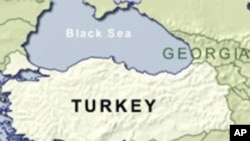Reconciliation efforts between the Turkish government and Kurdish rebels were given a boost last week when a small group of rebels from the outlawed Kurdistan Workers Party crossed over from Iraq and turned themselves into Turkish security forces. Some observers have called the largely symbolic event a turning point, but key challenges remain. One of those challenges is the plight of hundreds of Kurdish teenagers facing decades in prison after being accused of supporting terrorism.
Earlier this year, 16-year-old Hasan Dündar was walking home on an Adana street, not far from where there had been a clash between security forces and stone-throwing Kurdish youths protesting government policies.
"I was caught," he says, "as I was walking in the neighborhood. The police always pick up children here whenever there's trouble because it's a Kurdish neighborhood." He says they arrested everybody, put them into their armored van, and inside the van they started beating them. He says when they got to the police station, the beating continued.
Hasan says the beating he received was not the last.
At his home, where he felt more comfortable speaking about the incident, Hasan's family is having lunch. What happened to their son and his legal situation fills them with concern.
Hasan was arrested under Turkish anti-terror legislation introduced four years ago. The laws make no age distinction between between minors and adults. What is more, it allows for minors to be sent to an adult prison - which is exactly what happened to Hasan.
First, he says, they were taken to Kurkculer prison, and immediately the gendarmerie beat them for 2 to 3 hours. Then, he says, the guards took them inside and beat them more. Hasan says even when he went to the prison doctor for a tooth ache he was punched in the face.
Listening to Hasan describe the scene is his father, Halil, who who says Hasan was imprisoned for 3 months until being released on bail.
But Hasan's legal problems are not over. He's accused of stone throwing and that is considered an act of terrorism under Turkey's strict anti-terror law. This means, as his father explains, his son faces a lengthy jail term.
They recently sentenced 14- and 15-year-old children to 23 years imprisonment for throwing stones, Halili says. Most of the children in this neighborhood are psychologically damaged after being detained. He says, they go to prison as children and come out ruined.
The government says there is no systematic abuse in prisons or by their security forces, and, if it occurs, is the result of individual actions which the government punishes under a zero tolerance policy.
Local Human Rights groups say detained children regularly face abuse.
At the local branch of the Human Rights Association in Adana there are many families with children in a similar situation to Hasan. More than 1,000 Kurdish children across the region have been prosecuted under Turkey's anti-terror law and currently 300 are in jail, says the local head of the human rights association, Ethem Acikalin. He says the situation is intolerable.
This is against so many international conventions on children and human rights, he says, all of which Turkey has signed. He says, it is outrageous to be living in a country where a child who throws one stone and shouts one slogan is treated like they've planted a bomb or killed someone. He says it is absurd.
That is a feeling that is shared by the European union, which Turkey is seeking to join. EU officials in Brussels have strongly criticized Turkey's anti-terror laws. Richard Howitt of the European Parliament's committee on Turkey says the practice of jailing teenagers in adult prisons has to end.
"The European Union is very clear, the prevention of terrorism act does not met European standards, and the treatment of children, children being put in adult prisons is on contravention , the U.N. convention on the rights of the child. So there is no doubt we oppose such moves, that we make clear to our Turkish friends and colleagues that as part of the continuing reforms in the country it has to stop happening," Howitt said.
Such criticism, along with similar statements from national and international human rights groups, appears to be having an impact.
The spokesman for the parliamentary foreign affairs committee, Suat Kiniklioglu, admits reform is necessary but says change is not easy.
"Its a delicate issue on the one hand you need to address what offense you should be having as a sentence , but at the same time you also make sure it does not open an avenue for ill minded people to push these children to have their political ends be achieved. But it will be addressed I have been to a number of meetings when members of our party expressed their concern and desire to have it resolved," Kiniklioglu said.
Such uncertainty means it is unclear what will happen to the imprisoned children and those currently facing court, like Hasan. He is free now, but he knows he could be going back to jail, a prospect, he says, that fills him with dread.
News
Kurdish Teens Jailed Under Turkish Anti-Terror Law Pose Reconciliation Challenge
update

<!-- IMAGE -->



